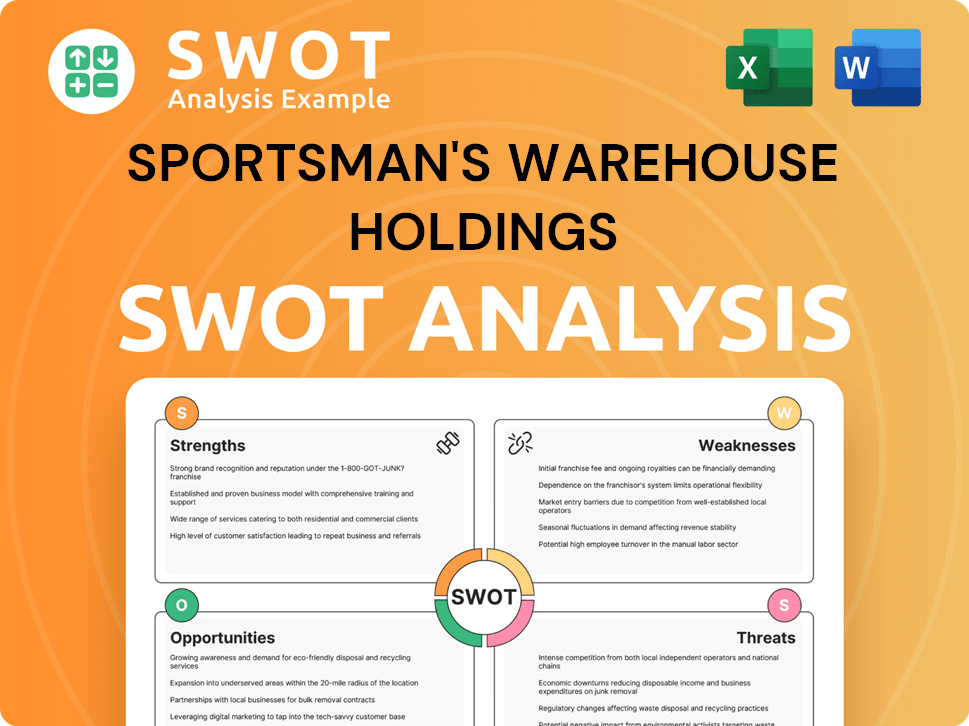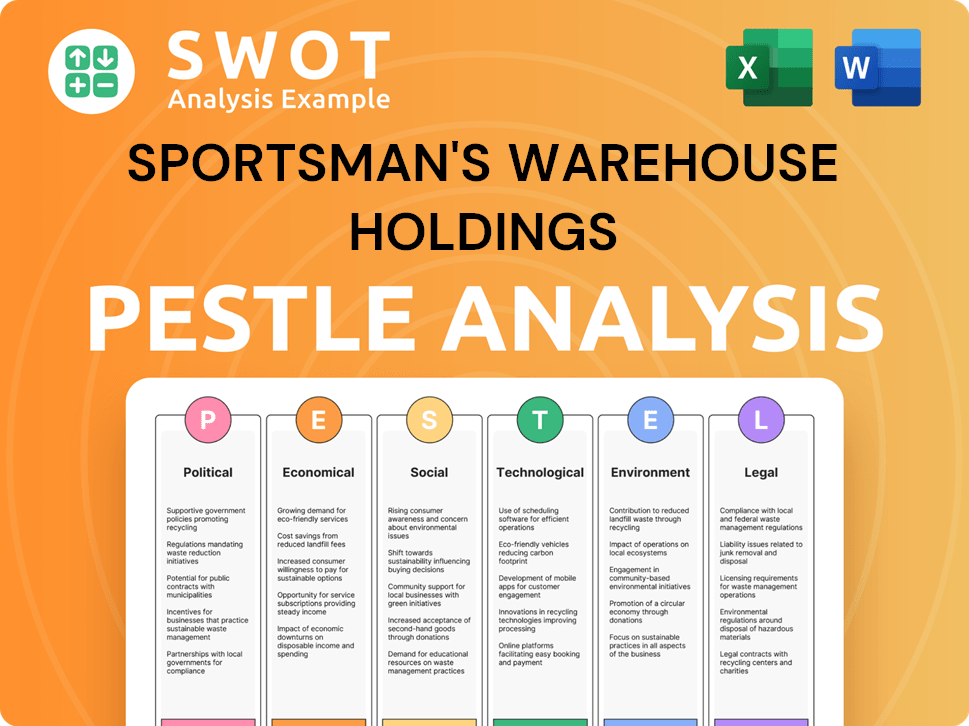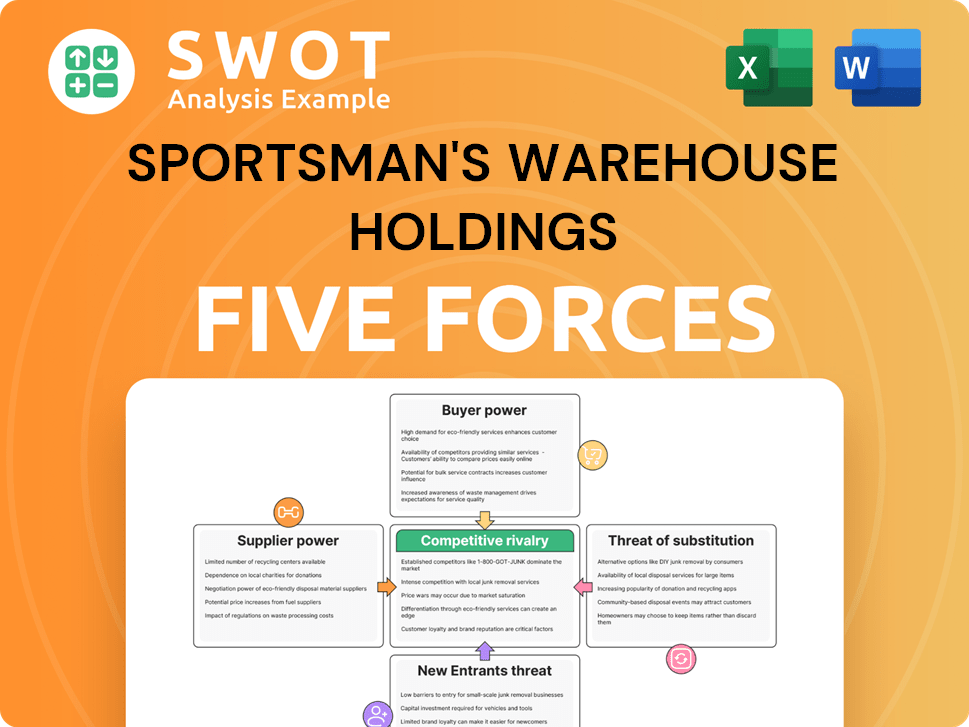Sportsman's Warehouse Holdings Bundle
Who Really Controls Sportsman's Warehouse?
Unraveling the ownership of Sportsman's Warehouse Holdings is essential for anyone tracking the dynamic Sportsman's Warehouse Holdings SWOT Analysis. From its roots in 1986 to its current standing as a major player in the outdoor gear market, the company's journey has been shaped by a complex web of stakeholders. Understanding who owns Sportsman's Warehouse reveals insights into its strategic decisions, market positioning, and future prospects.

The attempted acquisition by Great American Outdoors Group underscored the importance of ownership in the competitive sports retail landscape. As a publicly traded entity, Sportsman's Warehouse ownership structure involves a diverse group of institutional investors and individual shareholders. This analysis will explore the evolution of Sportsman's Warehouse ownership, providing a comprehensive view of its financial health, operational strategies, and the influences that shape its path.
Who Founded Sportsman's Warehouse Holdings?
The story of Sportsman's Warehouse began in 1986 with a single store in Midvale, Utah, founded by Bill King. The company quickly established itself as a key player in the sports retail sector, focusing on a wide selection of hunting and fishing gear. The early years were marked by organic growth and the establishment of a strong retail presence.
While Bill King is recognized as the founder of Sportsman's Warehouse, detailed information regarding the initial equity split and other early partners is not readily available in public records. The company's early focus was on building a strong retail foundation before seeking external investment or going public. This initial phase involved establishing a solid business model and expanding its presence in the outdoor sporting goods market.
Early agreements such as vesting schedules, buy-sell clauses, or founder exits from the company's initial private phase are not part of the publicly accessible corporate history. Similarly, details about any initial ownership disputes or buyouts that might have occurred in the nascent stages of the company's development are not widely reported. The founding team's vision, however, was clearly reflected in the initial business model of offering a comprehensive range of outdoor sporting goods, aiming to serve a diverse customer base of outdoor enthusiasts.
The initial focus of Sportsman's Warehouse was on providing a broad selection of hunting and fishing gear.
Bill King is recognized as the founder of Sportsman's Warehouse.
The company prioritized organic growth and establishing a strong retail presence.
Detailed information on equity splits and early partners is not available in public records.
The initial business model aimed to serve a diverse customer base of outdoor enthusiasts.
Details about initial ownership disputes or buyouts are not widely reported.
The early history of Sportsman's Warehouse ownership and its evolution provides valuable context for understanding the company's current structure. For a deeper dive into the company's strategic growth, consider reading about the Growth Strategy of Sportsman's Warehouse Holdings. The company's focus on offering a comprehensive range of outdoor gear has been a key factor in its ability to attract a diverse customer base. The company has shown resilience and adaptability in the competitive sports retail market. The company's financial performance in recent years reflects its strategic focus on customer satisfaction and market expansion.
The foundational years of Sportsman's Warehouse were marked by organic growth and a focus on building a strong retail presence.
- Bill King established the company in 1986.
- The initial business model centered on providing a broad selection of outdoor sporting goods.
- Detailed information about early ownership and equity splits is not publicly available.
- The company's initial strategy prioritized establishing a strong retail footprint.
Sportsman's Warehouse Holdings SWOT Analysis
- Complete SWOT Breakdown
- Fully Customizable
- Editable in Excel & Word
- Professional Formatting
- Investor-Ready Format

How Has Sportsman's Warehouse Holdings’s Ownership Changed Over Time?
The evolution of Sportsman's Warehouse ownership has been marked by significant shifts, particularly following its Initial Public Offering (IPO). The company, Sportsman's Warehouse Holdings, Inc., commenced trading on the NASDAQ on April 15, 2014, under the ticker 'SPWH.' The IPO priced shares at $10.00, with the company and a selling stockholder offering a combined 10,000,000 shares. This event was pivotal, establishing its status as a publicly traded entity and setting the stage for its future ownership structure.
The ownership landscape of Sportsman's Warehouse has transformed since its IPO, with institutional investors becoming major stakeholders. As of early 2025, a diverse array of asset management firms, mutual funds, and hedge funds hold substantial portions of the company's shares. For instance, as of March 31, 2024, key institutional holders included BlackRock Inc. and The Vanguard Group, Inc., among others. BlackRock Inc. held 6.8% of the shares, and The Vanguard Group, Inc. held 5.9% of the shares. These figures highlight the significant influence institutional investors wield in the company's strategic direction and governance.
| Event | Date | Impact on Ownership |
|---|---|---|
| IPO | April 15, 2014 | Transitioned from private to public ownership; increased institutional investment. |
| Proposed Acquisition by Great American Outdoors Group | Announced December 2020; Terminated December 2021 | Would have shifted ownership to a private entity; regulatory scrutiny demonstrated. |
| Ongoing | Early 2025 | Institutional investors hold a significant portion of shares, influencing company strategy. |
The attempted acquisition by Great American Outdoors Group, announced in December 2020, was a critical event. Had it succeeded, Sportsman's Warehouse would have transitioned back to private ownership. However, the deal's termination in December 2021 ensured the company remained publicly traded, maintaining its diversified ownership structure. This episode underscores the impact of regulatory oversight on significant ownership changes within the sports retail sector. For a deeper understanding of the company's customer base, explore the Target Market of Sportsman's Warehouse Holdings.
Sportsman's Warehouse ownership transitioned to public hands via an IPO in 2014.
- Institutional investors, such as BlackRock and Vanguard, are key stakeholders.
- The failed acquisition attempt highlighted the role of regulatory bodies.
- The company's ownership structure continues to be influenced by market dynamics and investor decisions.
- Understanding the ownership structure is vital for anyone interested in Sportsman's Warehouse stock or the outdoor gear industry.
Sportsman's Warehouse Holdings PESTLE Analysis
- Covers All 6 PESTLE Categories
- No Research Needed – Save Hours of Work
- Built by Experts, Trusted by Consultants
- Instant Download, Ready to Use
- 100% Editable, Fully Customizable

Who Sits on Sportsman's Warehouse Holdings’s Board?
The Board of Directors of Sportsman's Warehouse Holdings plays a critical role in the company's governance. As of early 2025, the board consists of a blend of independent directors and those with executive roles within the company. For instance, as of April 2024, Joseph P. Calabrese serves as the Chairman of the Board, and Shane M. Houghton is the Chief Executive Officer and a director. Other board members include independent directors who bring diverse expertise to the company, overseeing the strategic direction and representing shareholder interests.
The composition of the board and its decisions are regularly disclosed in the company's proxy statements and annual reports filed with the SEC. This transparency allows investors and stakeholders to understand the leadership structure and the individuals responsible for guiding the company's operations and financial performance. Understanding the Sportsman's Warehouse board of directors is essential for evaluating the company's strategic direction and governance practices.
| Board Member | Title | As of April 2024 |
|---|---|---|
| Joseph P. Calabrese | Chairman of the Board | April 2024 |
| Shane M. Houghton | Chief Executive Officer and Director | April 2024 |
| Other Board Members | Independent Directors | As of April 2024 |
The voting structure for Sportsman's Warehouse is typically based on a one-share, one-vote principle, which is common for publicly traded companies. Each share of common stock entitles its holder to one vote on matters brought before shareholders. There are no publicly reported special voting rights or dual-class shares that would grant outsized control to any single entity. The influence of large institutional shareholders can be significant, often engaging with management and the board on governance issues, indirectly shaping decision-making through their voting power. This Sportsman's Warehouse ownership structure ensures that all shareholders have a proportional voice in the company's decisions.
The board oversees the company's strategic direction and represents shareholder interests. The voting structure is based on a one-share, one-vote principle.
- The board includes independent directors and executives.
- Large institutional shareholders influence decision-making.
- Board composition is disclosed in proxy statements and annual reports.
- No special voting rights or dual-class shares are reported.
Sportsman's Warehouse Holdings Business Model Canvas
- Complete 9-Block Business Model Canvas
- Effortlessly Communicate Your Business Strategy
- Investor-Ready BMC Format
- 100% Editable and Customizable
- Clear and Structured Layout

What Recent Changes Have Shaped Sportsman's Warehouse Holdings’s Ownership Landscape?
In recent years, several key events have shaped the ownership landscape of Sportsman's Warehouse Holdings, Inc. A significant development was the proposed merger with Great American Outdoors Group, announced in December 2020. This deal, valued at approximately $800 million, aimed to take Sportsman's Warehouse private. However, the merger was terminated in December 2021 due to antitrust concerns raised by the Federal Trade Commission (FTC), leaving Sportsman's Warehouse as a publicly traded entity.
Following the failed merger, Sportsman's Warehouse has focused on strategies to enhance shareholder value. A notable move has been the implementation of share repurchase programs. In March 2024, the company authorized a new share repurchase of up to $50 million, indicating confidence in its financial standing and a commitment to returning value to shareholders. This focus on share repurchases can influence the Sportsman's Warehouse ownership structure by consolidating shares among existing investors.
| Key Event | Date | Details |
|---|---|---|
| Proposed Merger with GAOG | December 2020 | Deal valued at $800 million, aimed to take Sportsman's Warehouse private. |
| Merger Termination | December 2021 | Terminated due to antitrust concerns from the FTC. |
| Share Repurchase Authorization | March 2024 | New authorization of up to $50 million, reflecting confidence in valuation. |
The Sports retail industry, including the outdoor gear sector, is experiencing trends such as increased institutional ownership and a focus on e-commerce. While there haven't been major shifts in the ownership structure due to founder departures, the company's strategic initiatives, like share repurchases, and overall financial performance continue to influence Sportsman's Warehouse ownership dynamics. For more detailed insights, you can refer to this article about Sportsman's Warehouse Holdings.
Share repurchase programs demonstrate the company's commitment to increasing shareholder value. These programs can impact the Sportsman's Warehouse ownership profile over time.
The Sports retail sector is seeing increased institutional ownership and a focus on e-commerce. These trends indirectly influence ownership dynamics.
Sportsman's Warehouse continues to emphasize operational efficiency and market expansion. These strategies can affect investor confidence and ownership.
The company's financial performance and stock valuation play a crucial role in attracting and retaining investors, thereby influencing Who owns Sportsman's Warehouse.
Sportsman's Warehouse Holdings Porter's Five Forces Analysis
- Covers All 5 Competitive Forces in Detail
- Structured for Consultants, Students, and Founders
- 100% Editable in Microsoft Word & Excel
- Instant Digital Download – Use Immediately
- Compatible with Mac & PC – Fully Unlocked

Related Blogs
- What are Mission Vision & Core Values of Sportsman's Warehouse Holdings Company?
- What is Competitive Landscape of Sportsman's Warehouse Holdings Company?
- What is Growth Strategy and Future Prospects of Sportsman's Warehouse Holdings Company?
- How Does Sportsman's Warehouse Holdings Company Work?
- What is Sales and Marketing Strategy of Sportsman's Warehouse Holdings Company?
- What is Brief History of Sportsman's Warehouse Holdings Company?
- What is Customer Demographics and Target Market of Sportsman's Warehouse Holdings Company?
Disclaimer
All information, articles, and product details provided on this website are for general informational and educational purposes only. We do not claim any ownership over, nor do we intend to infringe upon, any trademarks, copyrights, logos, brand names, or other intellectual property mentioned or depicted on this site. Such intellectual property remains the property of its respective owners, and any references here are made solely for identification or informational purposes, without implying any affiliation, endorsement, or partnership.
We make no representations or warranties, express or implied, regarding the accuracy, completeness, or suitability of any content or products presented. Nothing on this website should be construed as legal, tax, investment, financial, medical, or other professional advice. In addition, no part of this site—including articles or product references—constitutes a solicitation, recommendation, endorsement, advertisement, or offer to buy or sell any securities, franchises, or other financial instruments, particularly in jurisdictions where such activity would be unlawful.
All content is of a general nature and may not address the specific circumstances of any individual or entity. It is not a substitute for professional advice or services. Any actions you take based on the information provided here are strictly at your own risk. You accept full responsibility for any decisions or outcomes arising from your use of this website and agree to release us from any liability in connection with your use of, or reliance upon, the content or products found herein.